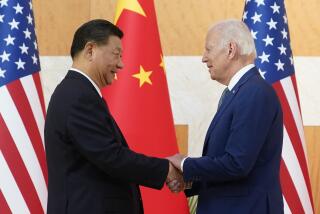Shanghai Pulls Out All the (Security) Stops
SHANGHAI — As this port city gears up for the biggest gathering of world leaders in China since the founding of the People’s Republic in 1949, there is little room for mistakes--or civil liberties.
President Bush, who arrives here tonight to attend the Asia-Pacific Economic Cooperation summit over the weekend, will see none of the traffic jams and human congestion that make this city of 13 million people one of the most dynamic in the world.
Officials imposed a mandatory holiday this week on some workers to clear streets and buildings near sites the global leaders will grace. Roadblocks have been set up, and armed soldiers are randomly checking drivers and passengers for identification papers. Out-of-town traffic is being diverted and taxis prevented from using the tunnel that leads to the conference area, which is across the river from the city’s fabled Bund waterfront.
Police cars stand ready to shut down all tunnels and bridges at a moment’s notice. Hotel guests must go through metal detectors and show that items such as cameras work.
“It’s Shanghai’s moment to shine,” said Chen Qimao, president of the Shanghai Society of International Relations. “The government will not tolerate even a one in a million chance for anything to go wrong.”
About 10,000 extra uniformed security personnel have descended on the city. Many more officers are believed to be in plainclothes. Fighter jets will patrol the skies. Navy boats will protect the waters. In the wake of a global anthrax scare, China has ordered incoming international express mail to be quarantined.
An additional 2,000 air marshals are expected to be traveling aboard Chinese airliners, which already carry armed guards on some flights. The airlines also stopped selling tickets to citizens of Israel and more than a dozen Muslim nations, including Afghanistan and Pakistan. Foreign Ministry officials insisted, however, that the move was a misunderstanding on the part of ticket agents and that the restriction does not apply to those with valid visas.
Even for Arab diplomats traveling on official business, these are not easy times. A Shanghai passenger described boarding a domestic flight with two Arab men who wore stickers on their lapels that read, “We are from the Saudi Embassy.” Even so, fellow passengers showed clear discomfort and requested flight attendants to keep an eye on them.
In Shanghai, the situation is worse for local Muslims who migrated from the sometimes restive province of Xinjiang. The western region is a trouble spot for the Chinese government because it shares a 47-mile border with Afghanistan and harbors a separatist movement that may have received support from Islamic groups in Central Asia.
During the best of times, life here is a struggle for Uighurs, members of a Turkic-speaking minority from Xinjiang. Like other poor peasants from the hinterland, they have flocked to Shanghai to find work as laborers or peddlers of roasted lamb.
A 20-year-old Uighur who has been hawking meat in Shanghai for three years said police told him and others to clear the streets until the dignitaries left. Police have been making frequent calls in the neighborhood that Xinjiang natives consider home, checking identification papers and talking to their landlords about their behavior.
Amid the clampdown is one sign of unexpected openness. Apparently for the convenience of APEC members, authorities Tuesday unblocked access to several major foreign media Web sites. The Times, Washington Post, Time magazine, Cable News Network and the British Broadcasting Corp. were among the previously censored sites that are now available.
*
Special correspondent Anthony Kuhn in Beijing contributed to this report.
More to Read
Sign up for Essential California
The most important California stories and recommendations in your inbox every morning.
You may occasionally receive promotional content from the Los Angeles Times.










